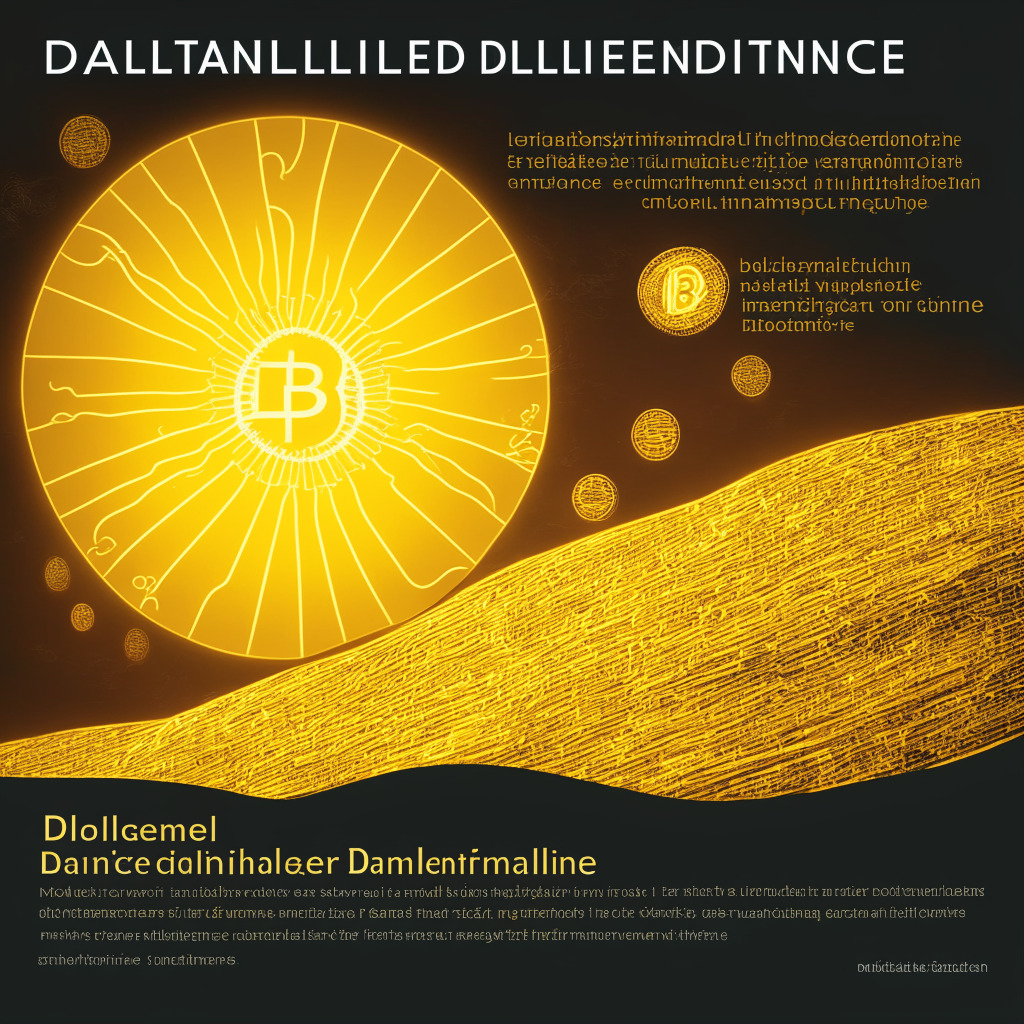“The decentralized finance platform, Balancer, suffered a security breach due to a ‘social engineering attack’ on its DNS service provider. The attack resulted in a loss of $238,000 in cryptocurrency. It’s speculated that ‘Angel Drainer phishing contracts’ were in play, causing significant concerns about DNS security patterns and considerations for switching to more secure DNS registrars.”
Search Results for: Virtu Financial
European Digital Euro: An Unhurried Approach to Future Financial Stability
Mairead McGuinness, European Commissioner for Financial Stability emphasizes cautious approach to digital euro implementation. As cash loses popularity and commerce digitalizes, a future with digital central bank public money is anticipated. The transition could massively impact cross-border payments and global financial sectors, hence the need for careful scrutiny.
Oxford’s JAX-LOB: Facilitating AI Trading and Reshaping Financial Markets
A multidisciplinary team from the University of Oxford developed JAX-LOB, the first GPU-accelerated limit order book simulator. Using JAX, a high-performing machine learning system by Google, the simulator enables AI training directly on financial data, potentially revolutionizing the financial world.
UK’s New Crypto Rules: Balancing Financial Security and Innovation
The UK’s Financial Conduct Authority now requires Virtual Asset Service Providers to gather and validate information on crypto transactions, even beyond local jurisdiction. This regulation, known as the Travel Rule, aims to counter money laundering and terrorist financing, yet raises concerns regarding privacy and curbing innovation within the growing crypto industry.
Crypto Correction and Market Downfalls: The Bittersweet Symphony of Financial Growth
The cryptocurrency market, including Bitcoin and Ether, is in a ‘significant downtrend,’ following last week’s sudden drop. This mirrors a downwards trend in traditional markets such as the Nasdaq Composite and S&P 500. Despite this, the economy continues absorbing policies from the past 16 months without visible harm to spending or job creation.
Emerging Trust in Bitcoin: Financial Giants are Getting Onboard with Cryptocurrency
David Rubenstein, founder of the Carlyle Group, expressed confidence in Bitcoin’s future and its increasing importance in financial assets. His views underscore the growing interest from major firms in Bitcoin and its acceptance as a regulation-free virtual currency.
HashKey Capital’s Approach to Virtual Assets: Strategic Focus or Over-Concentration Risk?
“HashKey Capital announces a new open-ended liquid digital assets fund, operating under Hong Kong Securities and Futures Commission’s supervision. The fund aligns with Hong Kong’s resurgence as a global cryptocurrency nexus, highlighting a well-tailored digital asset regulatory structure in the region.”
Navigating the Challenging Path: Huge Financial Risks in the New Frontier of Metaverse and Crypto
“Meta’s metaverse-centric arm, Reality Labs, has reported a loss of $7.7 billion this year, raising questions about the viability of metaverse projects. Despite this, the company also boasts an 11% year-over-year revenue growth and a robust growth in stock prices. This showcases the high risk-high reward nature of venturing into new technologies like metaverse and cryptocurrencies.”
Myanmar’s First Cryptocurrency Bank: A Revolutionary Leap towards Financial Liberty
Myanmar is set to launch its first institution operating solely on cryptocurrency, the Spring Development Bank, aiming to facilitate smoother cross-border transactions. Constructed on the Polygon network, this financial platform leverages blockchain technology for global accessibility, combating international transfer fees with the deployment of stablecoins.
Scaling the Borders of Financial Freedom: Shinhan Bank Tests Stablecoin Remittances on Hedera Network
Shinhan Bank, a South Korean banking titan, completed a successful test for stablecoin remittances on Hedera’s network, allowing real-time, instantaneous settlement and foreign exchange rate integration across three currencies. This process decreases complexities and cost for cross-currency transactions, offering a solution to high intermediary bank charges in current financial structures, especially with cross-border transfers.
Russia’s Digital Ruble: A Revolution in Finance or A Step Towards Financial Monopoly?
“Russia’s parliament is moving towards legislation for the ‘digital ruble’, their prospective Central Bank Digital Currency (CBDC). The proposed law hands power to the Bank of Russia to manage the CBDC infrastructure, issue currency, and guarantee safety. This move opens opportunities for new payment avenues and cross-border solutions, despite an initial skepticism and ban on digital assets.”
Digital Rouble: Boon for Retailers, Bane for Banks? The Debate on Russia’s Virtual Currency Saga
Russia’s parliament voted in favor of the “digital rouble” bill, moving towards a digitized financial infrastructure. While retail businesses expect profit, concerns about potential bank losses over the rapid transition to digital money have emerged. A country-wide rollout is planned for 2025-27, marking a significant point in Russia’s financial growth.
Navigating South Korea’s Virtual Asset User Protection Act: A Leap or a Hurdle for Crypto Market?
“South Korea’s National Assembly approved the Virtual Asset User Protection Act, laying a legal infrastructure for digital assets. This includes providing a definition for digital assets, creating penalties for inequitable transactions, enforcing strict regulatory measures, and introducing new entities for supervision.”
Hong Kong’s Virtual Asset Index: Boon for Crypto Adoption or Gateway to Volatility?
Hong Kong rating agency HKVAC announced its virtual asset index, including Bitcoin, Ethereum, and the largest 30 cryptos. This follows HSBC’s support for trading BTC and ETH futures ETFs, potentially driving mainstream adoption, yet also raising concerns about volatility, risk, and regulatory scrutiny.
Hong Kong Central Bank Pushes for Crypto Adoption: Pros, Cons, and Conflicts in the Financial World
The Hong Kong Monetary Authority (HKMA) is pressuring major banks like HSBC and Standard Chartered to accept crypto exchanges as clients, highlighting growing cryptocurrency acceptance and the need for traditional financial institutions to adapt to this evolving landscape.
Aligning Ukraine’s Crypto Regulations with EU Standards: Balancing Consumer Protection, Financial Stability, and Market Growth
The National Bank of Ukraine (NBU) is working towards aligning the country’s crypto regulations with European standards, particularly the EU’s Markets in Crypto-Assets (MiCA) legislation. The NBU emphasizes maintaining financial stability, consumer protection, and transparency, while considering Ukraine’s unique legal and financial systems.
Exploring Shiba Inu’s Rocket Hub: Impact on Virtual Landscape and $SHIB Ecosystem
The Shiba Inu team recently launched its anticipated Rocket Hub, Game Changer, and Ryoshi Plaza, which aim to transform the virtual landscape and enhance the $SHIB ecosystem. Shib also introduced Game Builder, a user-friendly development tool, enabling unique gameplay experiences.
TASE’s Blockchain PoC Success: Tokenizing Bonds, Fiat & Future Impact on Financial Industry
The Tel Aviv Stock Exchange (TASE) completed the proof of concept phase of Project Eden, exploring blockchain technology for issuing and settling government bonds. The PoC featured tokenization of the Israeli Shekel and used Ethereum Virtual Machine-compatible blockchain, with support from major international and local banks.
Risky Payment Apps vs Secure Bitcoin: Navigating FDIC Protection & Financial Security
The Consumer Financial Protection Bureau (CFPB) warns that funds stored in popular payment apps may not be insured, highlighting possible financial uncertainties. Bitcoin, with its decentralized nature and self-sovereignty, gains attention as a secure alternative providing users sole ownership and control over their funds, unlike payment apps.
Balancing Financial Security and Privacy: The Tornado Cash Sanctions Debate
The Blockchain Association supports Coin Center’s lawsuit against the US Treasury over its sanctions against Tornado Cash, arguing that the sanction raises regulatory and constitutional concerns. The case outcome could set a precedent for privacy-protecting services in the digital asset industry, emphasizing the need to balance financial security and individual privacy.
HKMA and CBUAE Collab on Virtual Assets: Boosting Fintech and Challenging US Hegemony
The Hong Kong Monetary Authority (HKMA) and the Central Bank of the United Arab Emirates (CBUAE) collaborate on virtual asset regulations and developments, aiming to strengthen cooperation, promote fintech initiatives, and improve cross-border trade settlement. This partnership coincides with Hong Kong’s Securities and Futures Commission allowing virtual asset service providers to cater to retail investors.
Hong Kong and UAE’s Central Banks Collaborate on Blockchain: CBDCs, mBridge, and Virtual Assets
Hong Kong and the UAE central banks are strengthening financial cooperation, focusing on virtual asset regulation and integrating central bank digital currencies (CBDCs) for cross-border trade transactions. The countries are collaborating on mBridge, a blockchain supporting multiple CBDCs, promising progress despite political complexities.
Hong Kong’s Virtual Asset Ambitions: Huobi’s Role, Licensing & the Crypto Ecosystem Debate
Hong Kong aims to become a virtual asset hub, with Huobi’s subsidiary launching spot trading and virtual asset custodial services. Huobi HK seeks license approval from Hong Kong’s Securities Regulatory Commission and plans to enhance security, compliance, and operational efficiencies. The success of top exchanges may lead to a more regulated virtual asset market in Hong Kong.
UAE and Hong Kong Join Forces: Crypto Regulations and Future of Virtual Assets
The UAE and Hong Kong are collaborating to enhance their regulatory frameworks in the virtual asset sector, focusing on financial infrastructure, market connectivity, and cryptocurrency regulations. A joint working group aims to facilitate effective implementation of regulatory measures for crypto businesses, promoting knowledge-sharing and fintech development initiatives to foster sector growth.
Centralized vs Decentralized CLOBs: Pros, Cons, and the Future of Trading Financial Instruments
The central limit order book (CLOB) has transformed financial instrument trading, but the rise of decentralized finance (DeFi) platforms raises questions over centralized vs decentralized CLOBs (dCLOBs). While dCLOBs offer a trustless, permissionless environment, centralized CLOBs provide better pricing and faster execution. Technologies like Avalanche subnets improve DeFi, but dCLOBs face challenges like limited functionalities compared to centralized systems.
Virtual Loonie: BoC’s Digital Currency Ambitions and the Impact on Crypto Market Dynamics
The Bank of Canada has opened a public consultation for a potential digital Canadian dollar, or virtual loonie. This move signifies mainstream acceptance of digital currencies but raises privacy concerns and potential market monopolization. The consultation aims to strike a balance between crypto benefits and security and privacy concerns.
Metaverse Mashup: Grealish, Heldens, and the Future of Virtual Experiences vs Security Concerns
Manchester City footballer Jack Grealish and DJ Oliver Heldens performed a DJ set in the OKX Collective metaverse, highlighting the growing interest in metaverse platforms. Despite exciting opportunities, the security, safety concerns, and potential risks of digital assets in decentralized technologies need addressing.
Reviving BTC: Wall Street Interest Boosts Market, Consolidation Ahead?
BTC/USD is nearing its 2023 high as market sentiment improves, due in part to Wall Street’s increasing interest in crypto. Recent filings for spot Bitcoin ETFs and the launch of EDX Markets indicate growing optimism. However, Bitcoin faces resistance at $31,000, and investors should monitor support and resistance levels while conducting thorough market research.
Bitcoin’s Surge: Are We Headed for $30,000? Institutional Interest, EDX Launch & Future Predictions
Bitcoin surges 11% due to the launch of EDX, a new digital exchange, and increasing institutional interest. Prominent investor Cathie Wood predicts a $1 million price target for Bitcoin and expresses confidence in Coinbase. Technically, the Bitcoin (BTC) reaches $30,000 milestone amid a favorable environment.
EDX Markets: Wall Street’s Crypto Leap Amidst Regulatory Hurdles
EDX Markets, a new cryptocurrency exchange, debuts with backing from Wall Street giants such as Citadel Securities, Fidelity Investments, and Charles Schwab. Offering liquidity, competitive quotes, and a non-custodial model, EDX Markets aims to attract industry leaders despite the SEC’s regulatory crackdown.
Finance Giants Enter Crypto: EDX Markets’ Regulated Approach vs Innovation Potential
EDX Markets, a crypto exchange backed by major finance players, recently launched targeting institutional investors. With close collaboration with US securities regulators, it avoids regulatory hurdles and takes a cautious approach by offering only four cryptocurrencies – Bitcoin, Ether, Litecoin, and Bitcoin Cash – for trading. The platform’s focus on regulation may impact innovation potential in the crypto world.
EDX Markets: A Leap Towards Crypto Adoption or Risky Business for Wall Street?
EDX Markets, a crypto exchange backed by established broker-dealers and venture capital firms, has launched. Offering safe and compliant trading services for select cryptocurrencies, the platform aims to attract brokers and investors while addressing regulatory scrutiny from US regulators. This launch signifies a significant step towards broader adoption and integration of cryptocurrencies into the traditional financial system.































